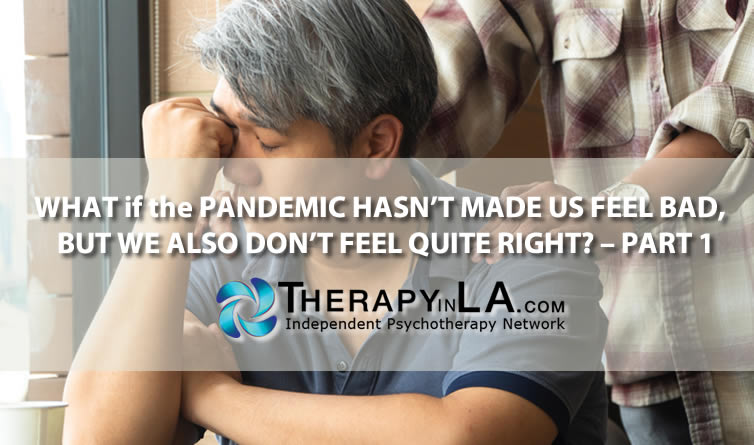WHAT if the PANDEMIC HASN’T MADE US FEEL BAD, BUT WE ALSO DON’T FEEL QUITE RIGHT? – PART 1
WHAT if the PANDEMIC HASN’T MADE US FEEL BAD,
BUT WE ALSO DON’T FEEL QUITE RIGHT? – PART 1
Have these many months of the COVID pandemic left you feeling “somewhat joyless and aimless”? Not quite burned out and without energy. Not quite hopeless, helpless, and trapped – depressed? Even as life in LA County and California is opening up towards something close to “normal”, are you not looking forward to much with excitement or even pleasure? There is a new term for this feeling of “stagnation and emptiness”: “languishing” (https://www.nytimes.com/2021/04/19/well/mind/covid-mental-health-languishing.html?).
In the beginning of the pandemic, many of us felt fear and anxiety for our safety and the well-being of our loved ones. We stayed home, shopped online as much as we could, washed our hands, began to wear masks, kept our distance from others, cleaned packages and items we brought into our home. If we had to go to work, we took extra steps of caution, and probably worried a lot. We developed new routines to cope with it all and settled into what became a long haul and a “new normal”. Many of us dealt with loss, whether it be to the virus itself, or more subtle forms of the loss of our usual comforts and pleasures.
We can think of psychological health as a continuum. It ranges from “the peak of well-being”, known as “flourishing”, to the depths of “ill-being”, known as “depression – despondent, drained, and worthless”. Languishing is in the middle somewhere. It’s an “absence of well-being”. We feel a lack of motivation, dulled ability to focus, and are likely to reduce our work efforts. We just want to get through the day, often not engaged with our kids very fully, and seeking nighttime relief with TV watching, over-eating, and perhaps over-indulging in other ways, too. Exercise suffers, as do friendships.
Some research indicates that folks who are languishing now, are at greater risk of depression and/or anxiety in the future. A study in Italy found that people who were languishing in the early months of the pandemic, were three times more likely to end up with PTSD. See Part 2 for corrective steps.
Alan M . Solomon, Ph.D. is a clinical psychologist in private practice in Torrance, CA. A member of the Independent Psychotherapy Network, he can be reached at 310 539-2772, or dralanms@gmail.com. In-person sessions are available, as are telehealth sessions.
Copyright 2021 by Alan M. Solomon, Ph.D.

